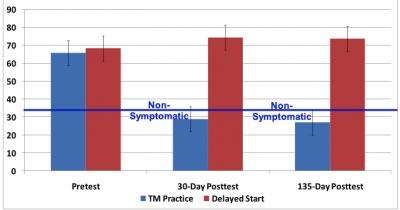A significant percentage of veterans returning from wars exhibit symptoms of posttraumatic stress disorder (PTSD). This is now recognized as a serious health problem, but what about the victims of such violence? Refugees live with the constant reminder of what war has done to their lives and those of their families.
A randomized / matched study published in the April 2013 issue of Journal of Traumatic Stress (Vol 26/2, pp 295-298) measured the severity of PTSD symptoms in refugees in Africa before and after learning the Transcendental Meditation technique. The reductions were dramatic.
42 refugees from the Congolese civil war, living in Uganda, were assigned to learn Transcendental Meditation (TM) immediately or wait until after the study. The participants were matched on age, gender and severity of symptoms at baseline. All participants were given the PTSD Checklist (PCL) at baseline, and 30-day and 135-day after learning TM meditation.

PCL scores in the control group trended upward from baseline to the two post-tests. In contrast, PCL scores in the TM group went from high at baseline, indicating severe post-traumatic stress symptoms, to a non-symptomatic level after 30-days Transcendental Meditation practice, and remained low at 135-days.

“We anticipated improvement, but I didn’t expect this magnitude of change. The continued improvement at four months also led us to conclude that Transcendental Meditation may be a very worthwhile intervention for anyone suffering from post-traumatic stress disorder.”

“I was surprised to see how quickly Transcendental Meditation practice had an effect on posttraumatic stress symptoms in these refugees, who had no home, no job, and very little support from their environment. These findings suggest that TM may be an effective antidote to the rising incidence of PTS in the world.”
The following video was taken of Esperance Ndozi, one of the Congolese refugees participating in the study. She was interviewed before learning the TM technique, and one week after regularly practicing it twice a day. The transformation was noticeable. Video credit: David Lynch Foundation
http://www.youtube.com/watch?v=goWNosrfFvI&playnext=1&list=PLUyyzUdEYObOk9j2u351S1KwhMX8UgUbI
A person with PTSD may be hyper-vigilant, sleep poorly, distrust others, have memory problems, and have difficulty making decisions and following through. Traumatized populations are challenged both by outer circumstances and by inner conditions to help themselves. Thus, posttraumatic stress symptoms are resistant to change by usual therapy. Reductions in posttraumatic stress in African refuges replicate findings in previous research with Vietnam veterans and Iraqi / Afghanistan veterans.
— Ken Chawkin,
Maharishi University of Management
MORE INFORMATION:
Africa PTSD Relief, a non-profit project aiming to reduce the pandemic of Post-Traumatic Stress Disorder throughout Africa


















